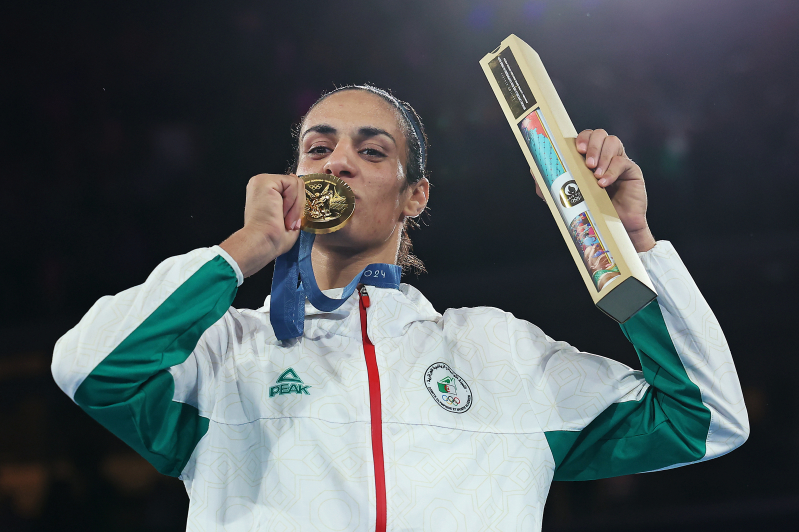
The controversy surrounding two gold-winning Olympic boxers, Algerian Imane Khelif and Taiwanese Lin Yu-ting, has led to a storm of accusations, misinformation and confusion about whether they were in fact two males fighting in women’s sport.
In an exclusive op-ed published in Christian Daily International, Prof. Gareth Jones, a renown Christian bioethicist and Emeritus Professor of Anatomy at New Zealand’s University of Otago, sheds light on the most likely scenario: that the two are intersex. And he challenges Christians to consider the medical facts and study what the Bible has to say rather than blindly join in the online chorus of condemnation and abuse.
Two controversial international sport bodies contribute to confusion
The two boxers had competed as women for years but were suddenly disqualified by the International Boxing Association (IBA) last year (2023) for failing gender eligibility tests. The International Olympics Committee (IOC), however, rejected the IBA’s findings and allowed them to compete at the Paris Olympics 2024 with Khelif winning a gold medal in the light-welterweight and Lin winning gold in the featherweight category.
The ensuing row has been significantly complicated by the fact that the IOC and IBA are both embroiled in controversies of their own.
The two organizations have been at odds as the Russian-dominated IBA is considered too close to Russian President Vladimir Putin and has been outspoken against the ban of Russian athletes by the IOC in the wake of Russia’s invasion of Ukraine. Accusations against IBA have also included corruption, judging scandals and financial misdeeds, according to media reports.
Furthermore, the timing of Khelif’s gender test last year appeared highly suspicious, as it came only three days after the Algerian won a fight against Russian Azalia Amineva who was previously unbeaten. Khelif’s subsequent disqualification meant that Amineva’s unbeaten record was restored.
While IBA stated that the boxers “did not undergo a testosterone examination but were subject to a separate and recognised test where the specifics remain confidential”, the lack of transparency further fueled online speculation.
The IOC on the other hand has been criticized for pushing LGBT ideology at a time when a number of national and international sports are marred by controversies surrounding biological males presenting themselves as trans women and beating biological females in women sports due to unfair biological advantages that go beyond the frequently cited testosterone levels.
As reported earlier by Christian Daily International, the IOC had published LGBT-affirming portrayal guidelines for media and other stakeholders in the lead up to Paris 2024, saying, “Every person, irrespective of their gender identity or sex variations, has the right to practice sport without discrimination and in a way that respects their health, safety and dignity”.
Therefore, many questioned the IOC’s statement that “Khelif was assigned female at birth and it says so on her passport, which is the International Olympic Committee's threshold for eligibility in boxing.”
The medical reality is more complicated than simply XX and XY
Meanwhile, bioethicist Prof. Jones told Christian Daily International that the furore evidenced two key aspects: “false information spreads very rapidly, and there is a considerable lack of understanding about the diversity of sexual expression.”
“All too readily these two become conflated into a dubious and dangerous recipe for misinformation and hurt,” he added.
The scientist explained that differences in chromosomes needed to be taken seriously. A varying chromatic count in biological tests did not necessarily mean the boxers presented themselves as men. He pointed out that the opinion touted in the wider media, that both Khelif and Yu-ting had XY chromosomes, have never been published, with “no convincing proof” by the IBA “to justify their actions.”
Jones elaborated there were “no grounds” to question the gender of the women who had competed in top-level competition in boxing for many years.
“It is deeply unfortunate that this background of claims and counterclaims set the scene for a welter of misinformation at the Olympics,” Jones lamented. “The people who suffered most were the two boxers, who were subject to condemnation and aggression.
“To make matters worse some claimed they were transgender, even though there was not a shred of evidence to justify this.”
Jones explained that some people have differences in genes, hormones and reproductive genitals in sex development. “It is possible for a person to have a womb plus testicles inside their body,” he stated.
This meant such people are “intersex”, not fitting into the classic male-female classification and “determining what someone’s sex is can, on occasion, be very complicated.”
He gave an example of a biological condition whereby an individual is born with ambiguous genitals. Androgen Insensitivity Syndrome (AIS) causes XY chromosomes but there is an inability to process male hormones and develop female external genitalia.
Another example is Congenital Adrenal Hyperplasia (CAH) causing women (XX individuals) to have androgen levels similar to men - and known illustrations of this are female athletes with high testosterone levels.
The issue has devastating consequences for some women athletes. To the extent that Human Rights Watch in Dec. 2020 called on a ban on sex testing. It highlighted how women track-and-field athletes, mostly from the Global South, have suffered abuse, being forced into medical surgeries and forced out of competitions.
Jones said attaining an “equal footing” between sports competitors was never easy but the IOC had “mottled history” when it came to determining the gender of boxers, which included invasive physical exams, similar to the procedures forced upon track-and-field athletes, although this is no longer required.
Tests for high testosterone levels have remained for women competitors though, and Jones said this is “far from a perfect predictor of an individual’s performance.”
Jones said IOC guidelines prioritize human rights but in his opinion, if sportswomen are “too successful and powerful” and perhaps if they look masculine, even from a different racial background – these factors make them potential targets for online abuse, just like Khelif and Lin.
What the Bible says about those who don’t fit into the male/female categorization
While the issue of intersex individuals’ participation in sports competition is something that should be sensitively dealt with by those in authority, Jones offered biblical perspectives that Christians should consider when approaching the topic of intersex individuals in general.
He pointed out the recording of eunuchs, not fitting into classic male-female classification, throughout the Bible including those listed in God’s people in Isaiah 56:3-7 and individuals who are eunuchs at birth or castrated, as mentioned by Jesus in Matthew 19:12. Jones also noted the respectful encounter between the apostle Philip and the eunuch on the road to Jerusalem in Acts 8:26-38.
“In the cultures of the time these were looked down upon and were considered to be foreigners, pagans, morally suspect, sexually illicit, because they were neither male nor female,” Jones said. “There was little room for them.”
According to Jones, the main biblical point emerging is Jesus calling on his disciples to learn from these eunuchs that sexual identity is not the central value in the kingdom of God.
“For Jesus we are to make room for these people, we are to appreciate them with all their differences, and we are to realize that sex may not be as simple as we sometimes make it out to be.”
Christian psychologist Mark Yarhouse suggested three approaches for Christians to support people dealing with “various forms of sexual malfunctioning”, according to Jones.
Firstly, integrity, which follows the “ideal maleness and femaleness” order of creation seen in Genesis. “But as we have seen this may not be achievable for those with Difference of Sexual Development (DSD), even if it is the ideal for most of the Christian community.”
Secondly, disability from the Fall, recognising “things go wrong”, which are “not a moral choice” and developmental disorders can be corrected, pending decisions by the individuals and advice from health professionals.
Thirdly, diversity, an approach “less wedded to the male-female binary model” with less interventions: “It expects a great deal of the surrounding community and its welcoming and acceptance of broken people.”
Jones reminded that everyone is made in the image of God, including those with disorders of sex development, which may be “aberrant by most standards.”
“This is the way in which they have developed from their earliest stages. They are what they are because this is the body that has been bestowed upon them. This is their gift from God and is the body they are to make the most of.”
Jones called on such individuals to be treated with respect, compassion and tenderness in the face of ridicule and rejection “by those who look down on them because they are not images of most others.”
“They are to be given opportunities in life to express themselves and fulfill their potential. They are also to be treated appropriately if there are ways in which their functioning can be improved. This is what we do in many other circumstances.”





